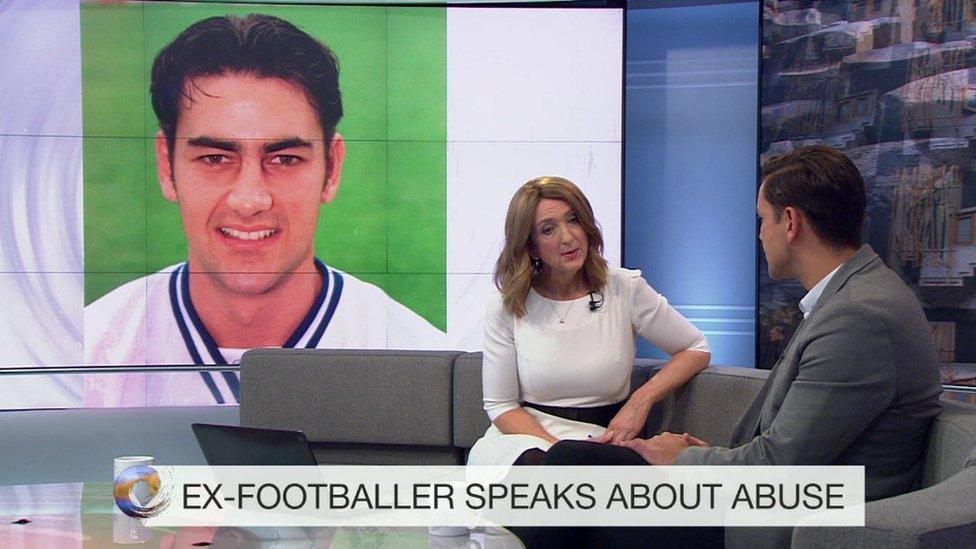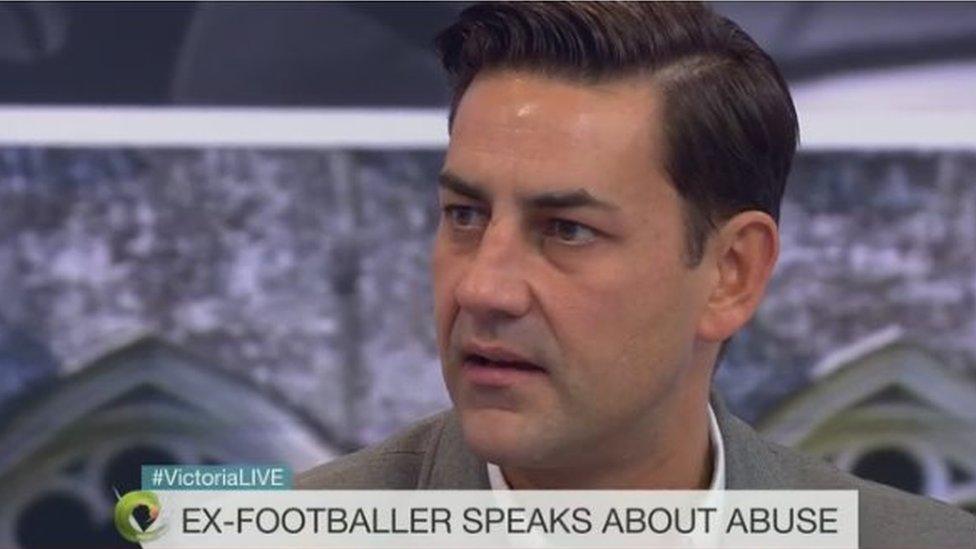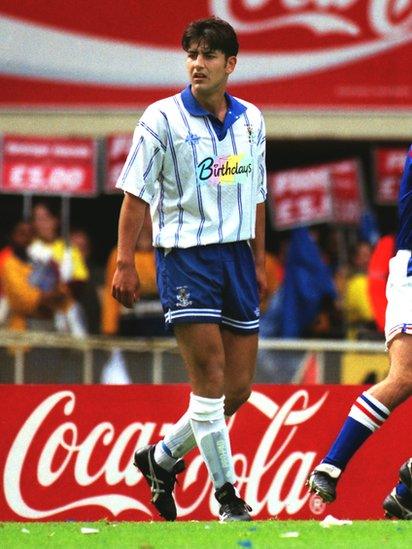Football abuse: One year on are young players safer?
- Published
Andy Woodward says despite the 'massive effect' on his life he is glad he spoke out
"The impact it's had has been catastrophic, and you live with that all of your life. I can't put into words what it has done to me. I think we survive and that's it. We survive."
When Andy Woodward first spoke out on November 16, last year, to the Guardian newspaper and then the BBC's Victoria Derbyshire programme, it felt like an important moment.
A former professional footballer, he sat on a couch under bright studio lights and gave a brutally honest account of the sexual abuse he suffered at the hands of his youth coach. It was harrowing stuff.
"Andy Woodward's pain was visibly tangible," said a viewer on Twitter. "Sadly football is no place to open up on any subject. I applaud his courage."

Mr Woodward says since speaking out there have been "moments of real darkness"
"I have sat here watching this interview in utter disbelief," said another email to the programme. "Let's hope what Andy has done will help others out there."
A week later and Mr Woodward was back on the same couch, this time alongside three middle-aged men all speaking eloquently for the first time about the abuse they say they suffered as young boys. All three had come forward after his first interview.
By Christmas, more than 25 former professionals had spoken out publicly in what Football Association chairman Greg Clarke was then calling the biggest crisis facing football. Many others contacted the BBC to tell their stories in private.
The last set of numbers released by the police in September give perhaps the best idea of the scale of the scandal although, if anything, they are still likely to be an underestimation.
To date, 784 victims have come forward linked to 331 clubs across the country from the grassroots to the Premier League. The youngest person identified so far was just four years old when they were abused. A total of 285 suspects are now being looked at as part of a series of police investigations.

Mr Woodward's interview led to other former professionals coming forward with allegations
"It's been the most dramatic year of my life. At times there have been moments of real darkness," said Mr Woodward, looking back.
"There have been times where I've thought, 'Should I have done it?' But when I see the numbers who have come forward, plus people talking about it in Parliament, it's given people the courage to speak out."
Elements of the scandal have, by necessity, vanished temporarily from the public eye as those police investigations start to make their way towards court.
The FA's own independent investigation, led by the QC Clive Sheldon, has started its work. At the last count, the team had interviewed 15 victims, with plans to speak to another 20 or 30 more. It is due to report back by Easter 2018.
A similar inquiry is under way in Scotland.

Andy Woodward, pictured in 1995, says "change needs to happen now"
Certainly some big name clubs have questions to answer. How did Aston Villa, for example, allow an abusive scout to remain on the books more than 18 months after staff say they were first warned about his behaviour?
There is pressure for change. A group of former players formed the Offside Trust to better support victims and promote the cause of safeguarding others. It's been contacted by more than 100 survivors in less than a year.
A second organisation, Save, started work over the summer pushing for, among other things, better criminal records checks and a new law making the covering up of abuse a criminal act.
But are football clubs and the FA now doing enough to protect the next generation of young players?
"No," says Mr Woodward. "We can't wait until the end of the [FA's] independent review. Change needs to happen now."
"I don't believe it's a safer place now than a year ago. What happened all those years ago to all those players cannot happen again."
In a statement, the FA said: "One year on since these disclosures, we want to acknowledge again the bravery of those who have broken their silence and, in the process, given inspiration to others to do likewise.
"The allegations of child sexual abuse that have come to light since November 2016 have seen us work with organisations across the game to re-double our efforts to ensure every child and young person has a safe, fun experience playing or participating."
The Victoria Derbyshire programme is broadcast on weekdays between 09:00 and 11:00 on BBC Two and the BBC News channel.